Behind Bars: Jailed for a decade, work keeps this inmate connected to the world outside
Female inmates working at a call centre in Changi Prison gain confidence and skills to re-enter the world outside, in this final part of a CNA series about life in jail.
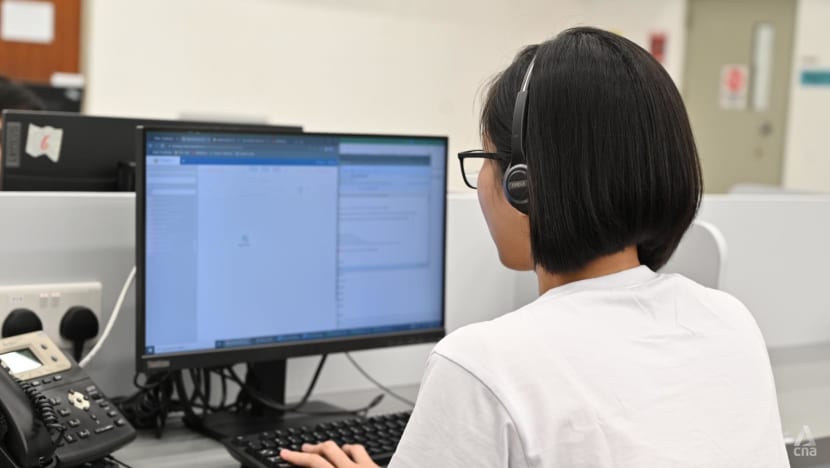
Sandy (not her real name) works as an agent at Agape Connecting People's connect centre in Changi Prison. (Photo: CNA/Raydza Rahman)

This audio is generated by an AI tool.
SINGAPORE: When Sandy (not her real name) was incarcerated in Changi Prison for drug-related offences, she had to give up her mobile phone – an iPhone 3.
It was the year 2013. TikTok was non-existent, Instagram was just gaining global popularity and messaging app Telegram had just been launched.
All this has remained alien to Sandy, who is serving a 20-year jail sentence. Being behind bars also means she does not have access to a computer or the internet.
This changed almost two years ago. Eager to gain some skills for when she returns to the workforce, she indicated her interest in joining a contact centre staffed by inmates like herself.
It was not all smooth sailing – it took her some time to relearn the basics of sending emails and using Microsoft Excel, and even how to talk with members of the public.
“It taught me how to prepare myself even though it’s been so long here, and taught me how to interact with society before I step outside,” she told CNA in an interview last month.
Sandy, now 36, expects to be released next year due to the usual one-third remission for good behaviour.
“It made me have my own confidence that I can do it; I can live a better life.”
Sandy is one of 35 to 40 female inmates working at a contact centre in Changi Prison that provides call centre services and marketing for various companies in the public and private sectors like healthcare and consumer goods.
The contact centre at Institution A4 – Singapore’s only women’s prison – is run by social enterprise Agape Connecting People, which has worked with Yellow Ribbon Singapore (YRSG) since 2014.
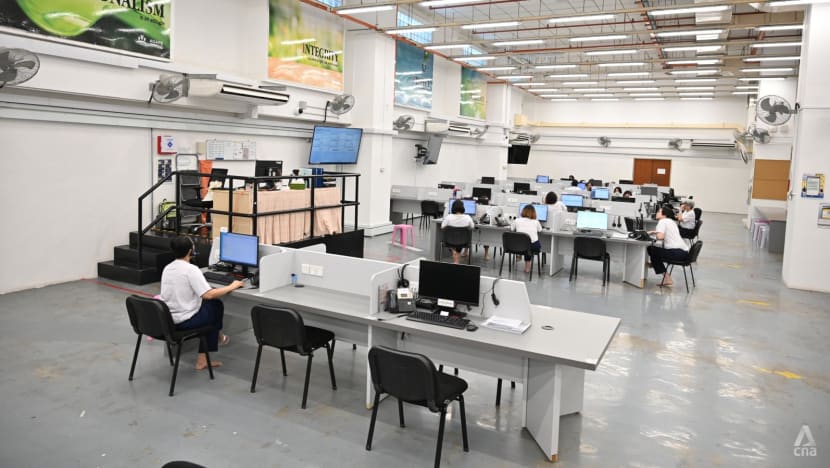
When CNA visited the centre in March, inmates were seated in groups in a spacious, air-conditioned room. Some were speaking to customers on the phone while others were answering queries on their computers, which restrict outside internet access.
Inmates typically work eight-hour shifts from 8am to 5pm five days a week, between Monday and Saturday. They get lunch and two tea breaks, and receive daily-rated allowances that they can remit home or use to buy extra toiletries and snacks in prison.
But more than the allowance, many inmates also earn a renewed confidence in their ability to hold down a job, and skills that they can use to make a living beyond prison bars.
Marsha (not her real name), another inmate jailed for drug-related offences, said she had always dreamed of working in an office.
“But outside, it was not really conducive because of the unhealthy lifestyle I was leading. I couldn’t hold on to a job for very long,” said the 38-year-old, who used to work in the food and beverage industry or ad-hoc administrative jobs.
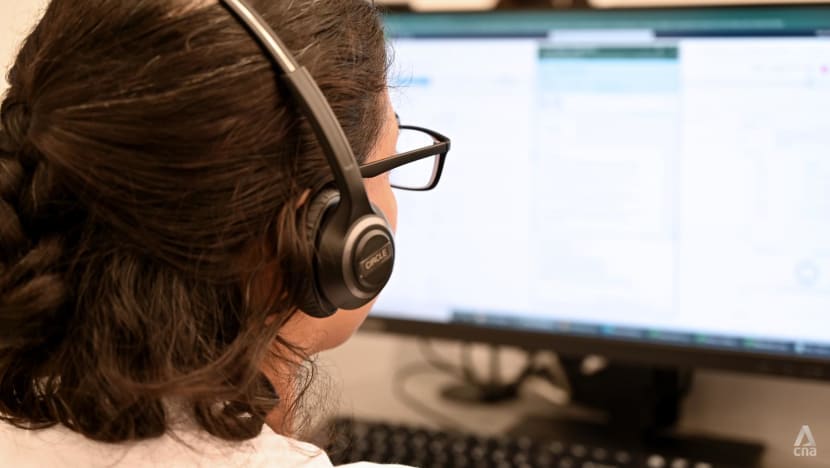
When she was jailed in August 2022, she told prison officers she wanted to work, and they recommended her for the contact centre. She started in October that year.
It was not her first time in prison. But with her previous incarcerations, Marsha had always absconded and been taken into custody suddenly.
“This time around with my family’s support, I managed to not jump bail,” she said. Instead, she was mentally prepared for her three-year sentence and started to see it as an opportunity to “untap (her) potential” by working.
An inmate can indicate her interest in working at the contact centre among the various work or study programmes available in prison. She then undergoes job interviews like any job seeker would, to assess her language skills and suitability for the job.
If she secures the job, she goes through training run by company employees as well as fellow inmates already working at the contact centre.
This includes product training and customer service skills so the inmates can speak confidently to customers, said Ms Liaw Li Qing, manager of YRSG’s private partnership scheme.
“They get to gain the relevant skill sets that they need to improve their employability potential after their release,” she said.
Agape also conducts Workforce Skills Qualifications accredited training for inmates.
DISCOVERING THEIR POTENTIAL
Marsha recalled feeling anxious about the test call she had to take before getting the work placement. But she passed on the first try.
“I didn’t think that I would be a sales-oriented person,” she said. “I didn’t know I had such skills in me.”
When Sandy first began working at the contact centre, she was paired with a buddy who taught her how to handle calls and book appointments for a healthcare firm.
“Product knowledge took about two weeks and we have to (learn) as much as we can. I’m not medically trained so everything had to be absorbed (quickly),” she added.
Eventually, she began speaking to “more difficult” patients and answering emails.
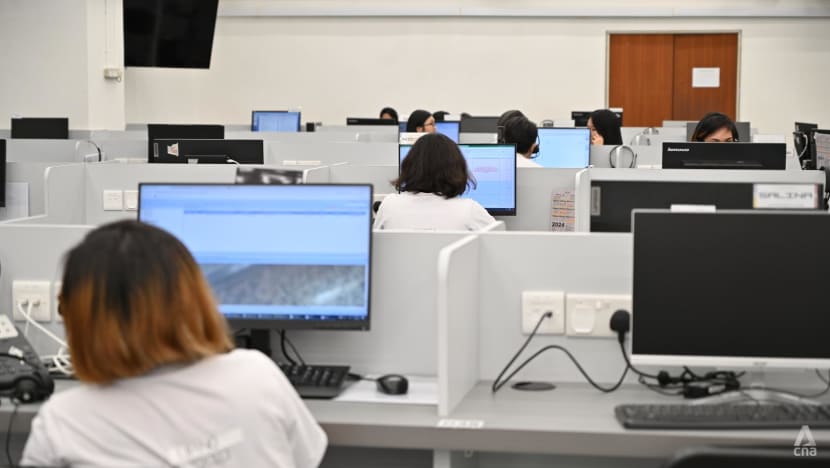
Inmates start out as agents who speak to customers on the phone using pseudonyms assigned by Agape’s staff.
With experience and good performance, they can be promoted to team leaders or take on quality assurance responsibilities, allowing them to listen in and monitor other team members’ phone calls.
Marsha’s sentence is short compared to other inmates, and she does not expect to become a team leader. But she has been recognised in other ways, like receiving an award for answering the most phone calls.
“So it’s not only about the position as a team leader, it’s also recognising our own talents and skills as well, individually,” she said.
Last year, Agape Connecting People itself won a gold award in the International Contact Centre Awards for best outsource contact centre programme or section.
Companies that partner with YRSG can set up their operations in workshops that mimic their facilities outside, allowing inmates to experience working in a real-life call centre or production facility, said YRSG’s Ms Liaw.
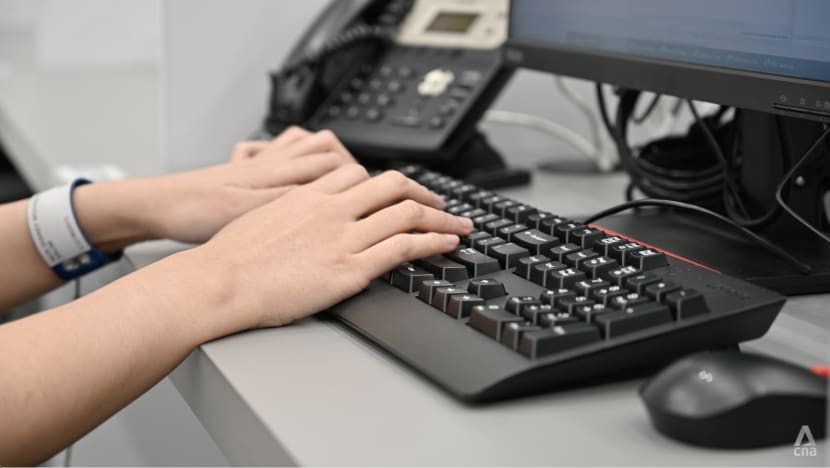
CONNECTION TO THE WORLD OUTSIDE
But the fact that these contact centre agents are working from Changi Prison can still turn otherwise ordinary encounters into memorable episodes.
Marsha recalled that on occasion, some customers wanted to buy her lunch as they were pleased with the assistance she gave them over the phone.
“So they would want to ask for my office’s address, which is of course not feasible for me to provide,” she said.
“I would thank them immensely for wanting to buy me lunch, but tell them that it’s the company’s policy, that I’m so sorry, I’m unable to accept such gifts.”
As for Sandy, dealing with demanding patients has given a new dimension to her conversations with family members when they visit her in prison.
“They say, wow, you can do it. I say yeah, I manage, but sometimes also when they come and see me, I vent my anger at them. I share with them what I’ve been facing and all this, so they tell me you have to be patient.”
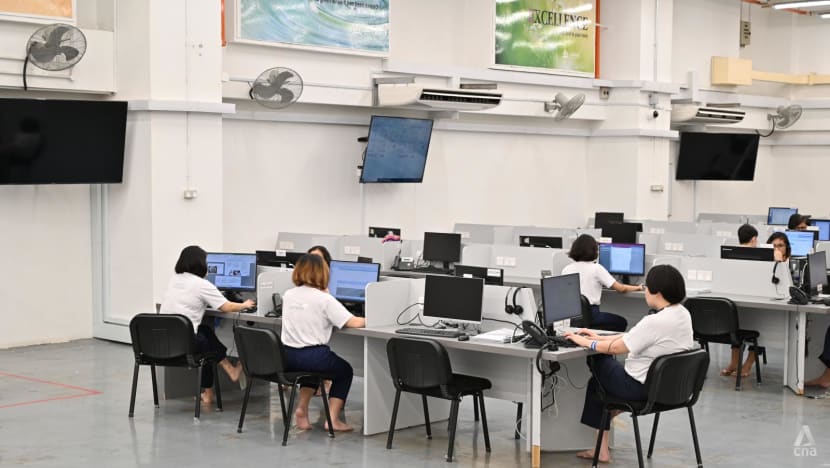
Working at the contact centre has served as a connection to the outside world for both inmates. Sandy, who used to work in a prison workshop, said life in the contact centre is “totally different” given that they get to interact with members of the public.
“I can never lose touch with the world outside ... I know what is going on there, even though I forget where is Ngee Ann City,” she quipped.
It has also allowed Marsha to feel good about being able to treat herself to small luxuries – like snacks – with the allowance she earns, and to be of service to others.
“I just feel good that I have knowledge, and being able to troubleshoot and resolve someone’s issue, it gives me self-satisfaction,” she said.
Marsha’s expected release date after remission will be in July. She feels excited but also anxious about the life ahead of her.
She will seek YRSG and Agape’s assistance to secure a job before her release. She hopes to continue working at a contact centre, although she is also open to other options.
“If while in prison I can work for a duration of over a year, I believe I can do better when I’m outside,” she said.
“So I’m going to take this opportunity to change myself, and also seek long-term employment and therefore get a better future.”


















